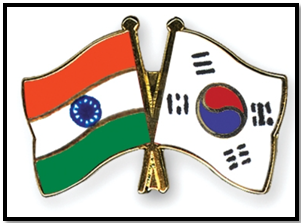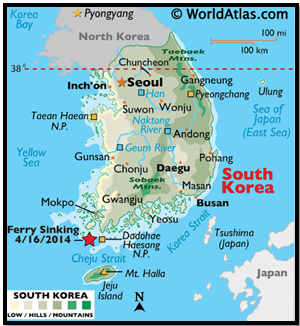REIGNITING THE FLAME OF INDIA-KOREA DEFENCE COOPERATION
Syllabus
- GS2: India and its Neighborhood- Relations.
Why in the News?
- Recently, General Manoj Pande, Chief of the Army Staff of India, visited the Republic of Korea, marking a crucial juncture in India-Korea defence relations.
- His diplomatic overture aimed to strengthen ties, addressing challenges and exploring opportunities for mutual growth in defence cooperation.
Source: keia.org
Strengthening Ties between India and Korea: A Key Diplomatic Move
- In November 2023, General Manoj Pande, Chief of the Army Staff of India, visited the Republic of Korea, highlighting the importance of defence collaboration for global peace.
- The visit bolstered diplomatic ties but also revealed challenges.
Challenges Faced
- Absence of a Shared Vision: Both nations lack a comprehensive defence framework, hindering aligned policies.
- Perception of India’s Role: Korea needs to recognize India’s regional power beyond being a defence product consumer.
Opportunities for Growth
- Technological Collaborations: India and Korea can innovate together in advanced defence systems.
- Counterterrorism Efforts: Collaborative efforts against terrorism, joint maritime security, and peacekeeping operations.
Moving Beyond Bilateral Ties
- Both nations need to go beyond simple cooperation.
- It’s time to shift perspectives and deepen their understanding of their roles in the fast-changing global landscape.
- This calls for a significant change in mindset.
Korean Perception of India’s Role
Hurdle in Recognizing India’s Role
- The Korean government struggles to recognize India’s regional importance, perceiving it mainly as a defense product consumer rather than a contributor to Indo-Pacific peace.
- Limited historical interaction and South Korea’s focus on North Korea and its alliance with the US contribute to this.
- Additionally, South Korea’s cautious balancing act between the US and China may hinder embracing strong ties with India, seen as a potential competitor to China.
Breaking Cold War Mentality
- Korea needs to move past Cold War-era thinking, where India was seen in opposition to the Soviet bloc.
- Shifting this mindset is crucial for fostering a deeper and more meaningful partnership with India.
Strategic Oversights in Defence Partnership
Limited Focus on Strategic Goals
- India’s emphasis on weapon acquisition and technology transfer from Korea, though crucial, has overshadowed broader strategic considerations.
- Similarly, Korea’s defence focus on profit-driven weapons sales to India lacks strategic depth, potentially hindering collaboration amid evolving geopolitics.
Challenge from Emerging Coalition
- The alliance of North Korea, China, and Russia presents a significant challenge to India-Korea collaboration.
- Divergent stances within this coalition may necessitate a careful evaluation of strategic imperatives for both nations.
Anticipated Unity through High-Level Engagements
- Pande’s interactions with Korean military leadership, including Defense Acquisition Program Administration (DAPA) and Agency of Defence Development (ADD), are expected to enhance unity.
- These engagements aim to strengthen defence communities and foster a more cohesive collaboration between India and Korea.
Technological Collaboration for Defence Advancement
Unleashing Technological Synergy
- India and South Korea are strategically aligning to co-develop advanced defence systems, tapping into their technological prowess.
- Recognizing the critical role of technology in future conflicts, this collaboration opens limitless possibilities, fostering innovation and self-reliance in defence capabilities.
Source: WorldAtlas.com
Addressing Evolving Threats
- In an era dominated by threats like space warfare, information warfare, and cybersecurity challenges, both nations are poised to explore cooperation avenues.
- Leveraging Korea’s digital prowess, they can develop robust security measures, countering emerging threats in the digital domain and safeguarding critical infrastructure and information.
Unified Counterterrorism Efforts
- India and South Korea share common concerns about terrorism, presenting an opportunity for strengthened collaboration.
- Exploring joint initiatives in maritime security, including coordinated patrols and information sharing in the Indian Ocean, aligns with their substantial maritime interests.
- This collaboration aims to enhance regional security and stability.
Peacekeeping and Collaborative Exercises
UN Peacekeeping Synergy
- India and South Korea, with rich UN peacekeeping experience, can amplify collaboration.
- Sharing insights and resources in peacekeeping operations will not only enhance regional stability but also reaffirm their joint commitment to global peace and security.
Joint Exercises for Preparedness
- Engaging in joint military exercises and sharing best practices in Humanitarian Assistance and Disaster Relief (HADR) reflect their shared responsibility in addressing natural disasters.
- This collaborative approach strengthens preparedness and responsiveness in times of crisis.
Expanding Cooperation Across Armed Forces
- General Pande’s visit has catalyzed an expansion of collaboration beyond naval focus, fostering interoperability and enhancing the capabilities of both nations’ armed forces.
Navigating the Future: Strengthening India-Korea Ties
Recent Revitalization
- Pande’s recent visit sparks a renewed commitment to India-Korea defence cooperation, offering fresh prospects for collaboration.
Strategic Approach Needed
- To overcome challenges and seize opportunities, a strategic and balanced approach is vital.
- Meticulous navigation and adaptability to the evolving geopolitical landscape will be key to fostering robust and enduring defence collaboration.
Building Resilient Partnership
- United, both nations are poised to navigate future complexities, fostering peace, stability, and prosperity in the Indo-Pacific region.
- This collaborative journey aims at creating a stronger and more resilient partnership.
| India South Korea Relations
Diplomatic Milestones · India and the Republic of Korea established diplomatic relations in 1973, building on consular relations formed in 1962. · Their partnership evolved into a “Strategic Partnership” in 2010 and was elevated to a “Special Strategic Partnership” in 2015 during PM Modi’s visit to Seoul. Historical Ties · The 13th-century Korean text “Samguk Yusa” highlights the historical connection between India and Korea. · Princess Suriratna from Ayodhya married King Kim-Suro in 48 AD, shaping Korean ancestry. · India’s role in the Korean War, with UN leadership by Indian diplomat K P S Menon and military contributions, including medical aid and peacekeeping forces, solidified bilateral ties. · Nobel Laureate Rabindranath Tagore celebrated Korea’s past in his 1929 poem “Lamp of the East,” fondly remembered in Korean textbooks. Trade Milestones · As of September 2023, India’s imports totalled US$ 18.8 billion, with exports at US$ 9 billion. · Key exports from India include mineral, fuels, cereals, and iron/steel. · Korea primarily exports automobile parts, telecommunication equipment, and petroleum products. Cultural Hubs · The Swami Vivekananda Culture Centre (SVCC), established in 2011, and the India Centre at Busan University foster cultural ties. · SARANG, an annual festival since 2015, showcases India’s rich art and music across South Korea. · Marking Gandhi’s 150th anniversary, a Korea-India Peace Park and 150 trees were inaugurated in Seoul. India-ROK Comprehensive Economic Partnership Agreement (CEPA) · India and the Republic of Korea (ROK) inked the Comprehensive Economic Partnership Agreement (CEPA) in Seoul on August 7, 2009, marking a new era of enhanced economic collaboration. · After twelve rounds of negotiations spanning over three years, CEPA officially commenced on January 1, 2010. Objectives · The agreement commits both nations to progressively reduce or eliminate import tariffs on a broad spectrum of goods over the next decade. · Additionally, it seeks to foster investment opportunities and facilitate the exchange of services. Tariff Reduction · ROK plans to phase out or decrease tariffs on 90% of Indian goods, while India reciprocates by doing so for 85% of Korean goods. Humanitarian Assistance and Disaster Relief (HADR) · HADR encompasses global initiatives to aid individuals affected by natural calamities and human-made crises. · Key interventions include emergency relief, infrastructure restoration, livelihood recovery, and disaster risk reduction. Crucial Actors · National Governments: Hold primary responsibility for citizens’ HADR. · International Organizations: e.g., UN, Red Cross, providing coordination and expertise. · NGOs: Deliver on-ground services, including food and medical assistance. · Military Forces: Contribute to operations through logistics, transportation, and engineering support. Recent Operations · Turkey-Syria Earthquake (February 2023): Extensive global HADR efforts ongoing. · War in Ukraine: Addressing the humanitarian fallout with a focus on essential needs. |
Source
- https://www.mea.gov.in/Portal/ForeignRelation/India-ROK-Sept-2023.pdf
- https://epaper.thehindu.com/reader?utm_source=Hindu&utm_medium=Menu&utm_campaign=Header
Mains Practice Question
Discuss the key challenges hindering the enhancement of defence cooperation between India and Korea, emphasizing the need for a shared strategic vision.

 Source: keia.org
Source: keia.org Source: WorldAtlas.com
Source: WorldAtlas.com

